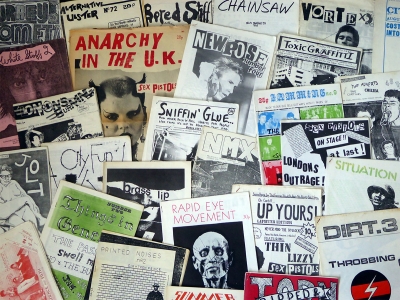Commentary
The French literary world was agog last year with the news of the awarding of two prestigious prizes, the Prix Goncourt and the Prix Medicis, to a novel called Le Testament Français, by a writer called André Makine. The unusual nature of the novel is that it was written in the most beautiful, yet freshly distinctive French by a man whose maternal tongue is not French at all, but Russian.
... (read more)The fanzine is not a magazine. It bypasses and subverts the economics of commercial publishing and it reasserts the creative link between writing and production. Zines can also, because of the ‘terrorism’ of their production and distribution, bypass the convoluted legalistic boundaries of copyright. Graphics, slabs of text, photos, and images are photocopied, scanned, and pasted into fanzine, then cut-up, reassembled, and often made to assume an oppositional symbolic meaning to that of the original image.
... (read more)Have you noticed what’s happened to the daiquiri? It’s been reinvented, by the Teen Literati. Now it doesn’t seem fair to blame the Industrial Revolution for what happened to the daiquiri, or to Writing in Australia in the 1990s, but the Industrial Revolution started it – you know, the steam engine, World Wars, radiation poisoning, filter-tipped cigarettes, Mickey Mouse, germ-free hamburgers, and air travel holidays for the working family. And the Industrial Revolution was kick-started by the bourgeoisie. That’s right: you people, the middle class.
... (read more)I remember hearing about the first Somerset Celebration of Literature when I was in Europe last year. The letters and postcards arrived: imagine a private college paying for Peter Carey to fly out first-class from New York to attend a literary event. Everyone was fixated on the details: limousines for authors; personal minders taking care of presenters; an army of volunteers looking after every detail.
... (read more)We are the stories we tell. We need our stories: they make us feel real. Stories give to our personal experience the particular shapes and cohesiveness we call ‘self’. When we enter into new friendships, when we fall in love, we tell our stories. The closer we draw to people, the more of our stories we are willing to risk. ‘Risk’ is always a factor. If we fall out with our closest friends, if love turns to enmity, the stories which are us may be stolen from our telling, and reshaped with malicious intent, putting at peril our cohesiveness, pressing us into despair, pushing towards the fragmentation of self we call madness. The stories which make us strong, self-confident, keep us vulnerable as well. Stories are easy to steal.
... (read more)When I started publishing my poems back in the early 1970s, I did so amidst a concern that Australian poetry was being Americanised: Coca-Cola, the pizza parlour, and the rock and rollers’ preoccupation with that thing called ‘lurve’ had swept all that was pure and true into the trashcan of history, and we with our Olsons, O’Haras, and Berrigans were unwitting accomplices to this annulling of our own birthright. My defence at the time would have been, ‘well, we’re taking aboard all that’s repulsive in American culture: their military and economic theses, their particular variety of consumerism, and no-one is protesting much about this – so why do they get so upset when we pick up on something of value from that culture?’ American artists themselves had absorbed things from other cultures without anyone there worrying about it. A great deal of the motivation behind the ‘New York School’ came from the French surrealists, though in translation surrealism had its more harebrained ideological aspects removed painlessly. In fact this ‘translation’ was a model of cultural appropriation, showing what a sea-change (and a change of tongue) can do to some seemingly immutable items.
... (read more)For Englishman Michael Dibdin, the road to success in crime fiction has been long, frustrating, and somewhat circuitous. After studying English at Sussex University, he went to Canada to do his PhD, dropped out, hit the hippie trail in the 1970s, then founded a business that went bust. In amongst that, his marriage went down the gurgler too. In short he had seen and experienced a great deal without making a fist of anything.
... (read more)Peter Schneider, who was born in Lubeck but grew up in Freiburg, studied philosophy, history and German literature at the universities of Freiburg, Munich and then West Berlin, where he has lived since the early 1960s. The immediate attraction of Berlin was that it enabled him to avoid military service but in the course of the 1960s Berlin became the centre of student activism. In 1965 he worked as a speech writer for the Social Democrats’ election campaign and in 1967 played a prominent role in the campaign against the right-wing newspapers of the Springer Press. From 1967 to 1971 Schneider was active as an organiser and speaker in the student movement in Berlin and then in Italy.
... (read more)Those fortunate enough to hear Professor Liu Haiping speak on ‘Universities in a Changing China’ in Melbourne last month were given much food for thought. As Dean of the School of Foreign Studies at Nanjing University he has been at the centre of a period of rapid change in Chinese higher education.
... (read more)I don’t suppose Rosemary Sorensen could have continued forever at ABR’s desk. All the same, I believe she has manoeuvred the journal into a liveliness other magazines lacked. It’s a cheerful thing to see the ABR flourishing, its covers in the public face in newsagents about the country: something that few other literary review journals have managed to do, outside their city of origin. Try, for example, to get a copy of Southerly, Westerly, Northern Perspective, Island, LiNQ or Imago across the counter anywhere outside their states of origin.
... (read more)

